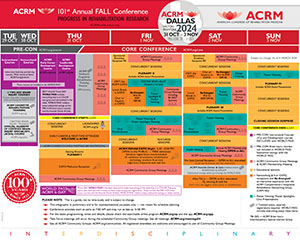Brain Injury
Clinical Practice
Adaptation of a Participation-focused Group Intervention for People with Traumatic Brain Injury
Saturday, November 2, 2024
12:15 PM - 12:30 PM
Location: Station 18: ROOM: POSTERLAND / Trinity Poster / Exhibit Hall REGION: Tower Lobby Level >>>

Jessica Kersey, PhD, OTR/L
Instructor
Washington University in St. Louis
St. Louis, Missouri, United States
Presenting Author(s)
Research Objectives: To adapt a participation-focused group intervention developed for people with stroke to address the distinct needs of people with traumatic brain injury.
Design: We conducted focus groups to identify barriers and facilitators of social participation that would suggest a need for adaptation to the structure or content of ENGAGE. We synthesized results, adapted the intervention protocol, then solicited participant feedback on the new protocol. After incorporating participant feedback, we then tested the adapted protocol. Finally, we conducted interviews with participants and interventionists to examine intervention satisfaction, identify potential feasibility or implementation barriers, and identify further areas for adaptation or refinement to finalize the protocol.
Setting: Community-based day rehabilitation program
Participants: Focus group participants (n=12) were community-dwelling adults who had experienced a moderate-severe traumatic brain injury at least 6 months prior to enrollment. Intervention participants (n=6) were adults with moderate-severe traumatic brain injury participating in a community-based day rehabilitation program.
Interventions: ENGAGE is a community-based group intervention developed for people with stroke. An occupational therapist and a peer mentor with a stroke co-deliver the intervention twice per week for 6 weeks. The intervention focuses on teaching strategies to identify and solve environmental and social barriers to participation using a metacognitive goal setting and problem solving framework. Through a combination of guided discovery and social learning, participants identify strategies to overcome participation barriers and achieve their participation goals. They they apply these strategies to individual goals, and through group community outings.
Main Outcome Measures: Qualitative examination of participation barriers, intervention adaptation needs, and participant satisfaction.
Results: Focus groups informed three primary changes to the ENGAGE stroke protocol to address the specific needs of people with TBI. These included structured reflection on lessons learned at the end of each session, expanded content focused on leveraging social networks, and greater focus on social activities, rather than other types of community, leisure, or health promotion activities. After testing the adapted protocol, feedback from participants and interventionists resulted in additional adaptations. These included simplified workbook materials and additional structured time to review previous lessons learned at the start of each session. Participants generally reported high satisfaction with the intervention program.
Conclusions: We determined that people with TBI required greater structure, more time for reflection, and more emphasis on social interactions to leverage social support and advocate for their needs. Adaptations to the ENGAGE intervention to address these distinct participation needs were well-received by participants. ENGAGE-TBI now requires feasibility testing prior to large-scale efficacy testing.
Author(s) Disclosures: N/A
Design: We conducted focus groups to identify barriers and facilitators of social participation that would suggest a need for adaptation to the structure or content of ENGAGE. We synthesized results, adapted the intervention protocol, then solicited participant feedback on the new protocol. After incorporating participant feedback, we then tested the adapted protocol. Finally, we conducted interviews with participants and interventionists to examine intervention satisfaction, identify potential feasibility or implementation barriers, and identify further areas for adaptation or refinement to finalize the protocol.
Setting: Community-based day rehabilitation program
Participants: Focus group participants (n=12) were community-dwelling adults who had experienced a moderate-severe traumatic brain injury at least 6 months prior to enrollment. Intervention participants (n=6) were adults with moderate-severe traumatic brain injury participating in a community-based day rehabilitation program.
Interventions: ENGAGE is a community-based group intervention developed for people with stroke. An occupational therapist and a peer mentor with a stroke co-deliver the intervention twice per week for 6 weeks. The intervention focuses on teaching strategies to identify and solve environmental and social barriers to participation using a metacognitive goal setting and problem solving framework. Through a combination of guided discovery and social learning, participants identify strategies to overcome participation barriers and achieve their participation goals. They they apply these strategies to individual goals, and through group community outings.
Main Outcome Measures: Qualitative examination of participation barriers, intervention adaptation needs, and participant satisfaction.
Results: Focus groups informed three primary changes to the ENGAGE stroke protocol to address the specific needs of people with TBI. These included structured reflection on lessons learned at the end of each session, expanded content focused on leveraging social networks, and greater focus on social activities, rather than other types of community, leisure, or health promotion activities. After testing the adapted protocol, feedback from participants and interventionists resulted in additional adaptations. These included simplified workbook materials and additional structured time to review previous lessons learned at the start of each session. Participants generally reported high satisfaction with the intervention program.
Conclusions: We determined that people with TBI required greater structure, more time for reflection, and more emphasis on social interactions to leverage social support and advocate for their needs. Adaptations to the ENGAGE intervention to address these distinct participation needs were well-received by participants. ENGAGE-TBI now requires feasibility testing prior to large-scale efficacy testing.
Author(s) Disclosures: N/A
Learning Objectives:
- Upon completion, participants will identify methods used to adapt ENGAGE to address the distinct needs of people with TBI
- Upon completion, participants will summarize the differences in intervention priorities and needs identified by people with TBI
- Upon completion, participants will describe the adaptations made to a stroke intervention to enhance its relevance and effectiveness for people with TBI

.jpg)
.jpg)
.jpg)
